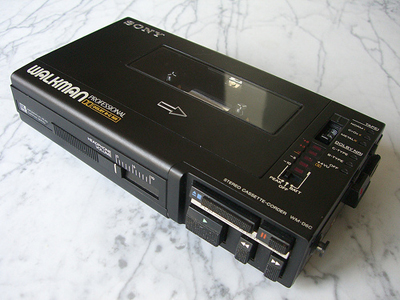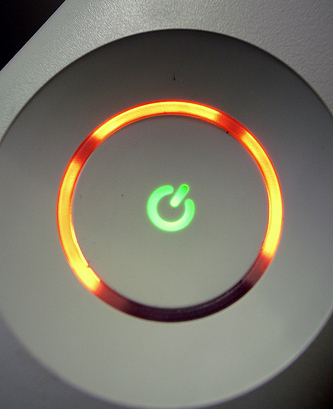The Results: Which Tech CEO would you fire?
May 14, 2009 | 11:43
Companies: #microsoft #nvidia #sony #via

Several strong candidates for being given the boot emerged from last week’s blog post, some of which I whole-heartedly agree with and others which I found quite wide of the mark.
Before we decide who really should get the chop, we should bear in mind the words of Surallan: the team that makes the most money will win, the team that doesn’t will lose and on that team, one of you is going to get fired (cue pointing).
In other words, a CEO’s responsibility isn’t solely or directly to serve customers, make great products, be a cool guy or give good quotes to the press – he or she needs to deliver profit and growth to the company he or she leads, and to its shareholders (indeed, in the US, it’s a legal requirement for shareholder owned companies to maximise the profit they return to the shareholders). So, let's see who was put up for firing...
[break]
“Those CEOs who devised the inkjet pricing model, replacement cartridges,” received an early nod from Turbotab, and a few enthusiastic seconders. While there’s no doubt that the high price of ink cartridges for inkjet printers sucks from a consumer’s point of view, the question is whether it works from a business point of view.

The ‘razor and blades’ model – attracting consumers by selling the device cheap and then hooking them onto pricy refills – is certainly a well established one (it even has its own Wikipedia page), and it makes specific reference to inkject printers. So the only question is, does it work?
Let's take HP as an example. Overall, it seems to be doing reasonably well – its first quarter 2009 earnings report revealed a rise in revenue over the previous year (only 4%, but in a recession, that’s very good going).
A closer look reveals that the printer business did fare badly – revenue declined 19%, but supply revenue dipped only 7%, compared to consumer printer hardware, which plummeted by 31%. The problem isn’t with the ink, it’s with the printers themselves. Now, you could argue that people are holding off from buying printers purely because ink is expensive, but given that it’s widely known how much ink costs and has been for a long time, the drop in sales of printers is more likely to do with the recession, not people suddenly waking up to the way the printer biz works. Sorry, but I think the printer CEOs are staying.
The next most popular suggestion were the CEOs banging on about piracy. This is a far clearer cut case than the printers and ink, I think. Suing your customers generates an incredible amount of negative press, and it’s obvious when it comes to music retailing that the success stories are those where DRM isn’t an issue (Emusic, Amazon) or where it’s light enough not to bother most consumers (iTunes).
Even those in the latter camp are moving towards getting rid of it, and when the CEO of Sony is publicly blaming the closed approach of his company’s past designs for its failure to repeat the Walkman's success with MP3 players (as he did in a recent interview), I think we can say ‘case closed.’

Speaking of Sony, what about the Japanese giant? A few commenters called for heads to roll. As Skiddywinks put it, “Only the CEO? I'd fire everyone from Sony that ever released a statement with anything to do with the PS3 or any other console this generation.” Well, Sony has pretty much answered this one for us, as many of those who spearheaded the PS3 project have gone or been sidelined.
Sony’s current CEO, Welsh-born Sir Howard Stringer has been in charge since 2005, but arguably by then it was too late to stop the trainwreck that was the launch of the PS3. As noted above, he’s certainly making the right noises on DRM, too. My problem with Sir Howard is that he’s been making a lot of the right noises since 2005, but not a lot seems to have changed – PS3 aside, Sony is still releasing poor products such as the P-series not-a-netbook-honest.
Sure, Sony is making nice TVs and sleek MP3 Walkmans, but there’s been a distinct lack of world changing products from it. I think, however, given rumours of the PSP-phone and the fact that the PS3 appears to be out of intensive care, that I’d given him a bit more time. But he needs good results and soon – financially, Sony had a terrible 2008.
I’m not surprised Hector Ruiz from AMD got a mention, but as yakyb pointed out, he’s already gone. Yakyb then went on to make a great suggestion: “I would ask Via's WenChi Chen to step down... they havn’t made the progress they could have in the last three years with the adoption of netbooks and low power computing.”
Fantastic point; given its status as a Taiwanese firm with strong ties to Asus etc, an x86 license and a decent low power CPU (Nano) Via really should have been at the forefront of netbooks. Instead, it’s all about Atom. Via’s latest financial results were pretty poor, too: “Net sales for 1Q'09 were NT$ 1,282 million, compared to 1Q'08 sales of NT$ 2,683million.”
 Mp3manager came up with the best putdown, when describing the handling of Tivo by its execs: “If he was in charge of KFC, he would probably market it as lukewarm , greasy dead bird.” Hard to argue that Tivo is something of a screw-up: it has great mindshare, was first to market, but it largely failed to catch on outside the US and Canada and subscriber numbers are dropping. I was surprised to read it has just 3.46 million US subscribers – a tiny amount.
Mp3manager came up with the best putdown, when describing the handling of Tivo by its execs: “If he was in charge of KFC, he would probably market it as lukewarm , greasy dead bird.” Hard to argue that Tivo is something of a screw-up: it has great mindshare, was first to market, but it largely failed to catch on outside the US and Canada and subscriber numbers are dropping. I was surprised to read it has just 3.46 million US subscribers – a tiny amount.
Given the rise of iPlayer and similar IPTV services, as well as the easy, cheap availability of generic hard disk recorders, the future looks bleak for Tivo.
Nvidia’s Jen-Hsun Huang received a few votes – the enthusiastic rebranding, aggressive quotes about competitors, and the hyperactive approach to new marketing initiatives which are dropped as quickly as they’re launched – the charge sheet against him has some big issues on it.
However, in his favour is what Nvidia is as a company and what it has achieved: I’m not saying he built the company entirely on his own, but he founded it, and he’s lead it since day one. G80, the GeForce 6-series, the GeForce 4-series – Nvidia has created some seriously great graphics cards in its time, and according to Valve’s hardware survey, the company enjoys a big lead over ATI in terms of marketshare, with 66% of gamers on GeForce compared to 28% with Radeons.

There’s one more popular suggestion to deal with: Steve Ballmer. I don’t think he should be on the list for the fact Microsoft charges for Xbox Live, as one commenter suggested – it’s standard on the PC to pay for online play in MMOs, and Sony’s mode to make its rival PSN free was clearly an attempt to make up for the fact that Live really is a very good piece of work.
There’s an argument that Microsoft should now look at making Live free to respond to Sony, but given how well the Xbox 360 is doing against the PS3, Microsoft clearly feels it doesn’t need to alter its strategy.
That said, the list of mistakes Microsoft has made since Ballmer has been CEO (January 2000) is long: there’s writing off billions of dollars because the Xbox 360 was released to market with a disastrously high failure rate, the ongoing embarrassment that is the Zune, the mishandling of Vista’s development and launch, Games for Windows Live, and that in two key new business areas, Microsoft is nowhere: MSN and Live have failed to make significant inroads into Google’s search marketshare and if Windows Mobile was getting beaten any harder by the iPhone, it would have to be classified as torture.
All of these failures represent major strategic blunders and are clearly reflected in Microsoft’s recent poor financial results (its first drop in revenue since 1986), and as a result, massive redundancies. I’m sorry to say this, but Steve, you’re fired.
Updated: Xtrafresh pointed out that I didn't respond to his suggestion of the CEO of Jmicron for "for almost singlehandedly killing off all enthousiast buzz over SSDs". I've got to admit I don't think this charge sticks - for starters, Jmicron has managed to sell its products to plenty of other companies and expand its business, and secondly, I'm not convinced it has killed off the buzz - OCZ's Apex SSD uses two Jmicron controllers and we thought it was excellent.
Before we decide who really should get the chop, we should bear in mind the words of Surallan: the team that makes the most money will win, the team that doesn’t will lose and on that team, one of you is going to get fired (cue pointing).
In other words, a CEO’s responsibility isn’t solely or directly to serve customers, make great products, be a cool guy or give good quotes to the press – he or she needs to deliver profit and growth to the company he or she leads, and to its shareholders (indeed, in the US, it’s a legal requirement for shareholder owned companies to maximise the profit they return to the shareholders). So, let's see who was put up for firing...
[break]
“Those CEOs who devised the inkjet pricing model, replacement cartridges,” received an early nod from Turbotab, and a few enthusiastic seconders. While there’s no doubt that the high price of ink cartridges for inkjet printers sucks from a consumer’s point of view, the question is whether it works from a business point of view.

The ‘razor and blades’ model – attracting consumers by selling the device cheap and then hooking them onto pricy refills – is certainly a well established one (it even has its own Wikipedia page), and it makes specific reference to inkject printers. So the only question is, does it work?
Let's take HP as an example. Overall, it seems to be doing reasonably well – its first quarter 2009 earnings report revealed a rise in revenue over the previous year (only 4%, but in a recession, that’s very good going).
A closer look reveals that the printer business did fare badly – revenue declined 19%, but supply revenue dipped only 7%, compared to consumer printer hardware, which plummeted by 31%. The problem isn’t with the ink, it’s with the printers themselves. Now, you could argue that people are holding off from buying printers purely because ink is expensive, but given that it’s widely known how much ink costs and has been for a long time, the drop in sales of printers is more likely to do with the recession, not people suddenly waking up to the way the printer biz works. Sorry, but I think the printer CEOs are staying.
The next most popular suggestion were the CEOs banging on about piracy. This is a far clearer cut case than the printers and ink, I think. Suing your customers generates an incredible amount of negative press, and it’s obvious when it comes to music retailing that the success stories are those where DRM isn’t an issue (Emusic, Amazon) or where it’s light enough not to bother most consumers (iTunes).
Even those in the latter camp are moving towards getting rid of it, and when the CEO of Sony is publicly blaming the closed approach of his company’s past designs for its failure to repeat the Walkman's success with MP3 players (as he did in a recent interview), I think we can say ‘case closed.’

Image from Flickr user edvvc
Speaking of Sony, what about the Japanese giant? A few commenters called for heads to roll. As Skiddywinks put it, “Only the CEO? I'd fire everyone from Sony that ever released a statement with anything to do with the PS3 or any other console this generation.” Well, Sony has pretty much answered this one for us, as many of those who spearheaded the PS3 project have gone or been sidelined.
Sony’s current CEO, Welsh-born Sir Howard Stringer has been in charge since 2005, but arguably by then it was too late to stop the trainwreck that was the launch of the PS3. As noted above, he’s certainly making the right noises on DRM, too. My problem with Sir Howard is that he’s been making a lot of the right noises since 2005, but not a lot seems to have changed – PS3 aside, Sony is still releasing poor products such as the P-series not-a-netbook-honest.
Sure, Sony is making nice TVs and sleek MP3 Walkmans, but there’s been a distinct lack of world changing products from it. I think, however, given rumours of the PSP-phone and the fact that the PS3 appears to be out of intensive care, that I’d given him a bit more time. But he needs good results and soon – financially, Sony had a terrible 2008.
I’m not surprised Hector Ruiz from AMD got a mention, but as yakyb pointed out, he’s already gone. Yakyb then went on to make a great suggestion: “I would ask Via's WenChi Chen to step down... they havn’t made the progress they could have in the last three years with the adoption of netbooks and low power computing.”
Fantastic point; given its status as a Taiwanese firm with strong ties to Asus etc, an x86 license and a decent low power CPU (Nano) Via really should have been at the forefront of netbooks. Instead, it’s all about Atom. Via’s latest financial results were pretty poor, too: “Net sales for 1Q'09 were NT$ 1,282 million, compared to 1Q'08 sales of NT$ 2,683million.”

Given the rise of iPlayer and similar IPTV services, as well as the easy, cheap availability of generic hard disk recorders, the future looks bleak for Tivo.
Nvidia’s Jen-Hsun Huang received a few votes – the enthusiastic rebranding, aggressive quotes about competitors, and the hyperactive approach to new marketing initiatives which are dropped as quickly as they’re launched – the charge sheet against him has some big issues on it.
However, in his favour is what Nvidia is as a company and what it has achieved: I’m not saying he built the company entirely on his own, but he founded it, and he’s lead it since day one. G80, the GeForce 6-series, the GeForce 4-series – Nvidia has created some seriously great graphics cards in its time, and according to Valve’s hardware survey, the company enjoys a big lead over ATI in terms of marketshare, with 66% of gamers on GeForce compared to 28% with Radeons.

Image from Flickr user yoppy
There’s one more popular suggestion to deal with: Steve Ballmer. I don’t think he should be on the list for the fact Microsoft charges for Xbox Live, as one commenter suggested – it’s standard on the PC to pay for online play in MMOs, and Sony’s mode to make its rival PSN free was clearly an attempt to make up for the fact that Live really is a very good piece of work.
There’s an argument that Microsoft should now look at making Live free to respond to Sony, but given how well the Xbox 360 is doing against the PS3, Microsoft clearly feels it doesn’t need to alter its strategy.
That said, the list of mistakes Microsoft has made since Ballmer has been CEO (January 2000) is long: there’s writing off billions of dollars because the Xbox 360 was released to market with a disastrously high failure rate, the ongoing embarrassment that is the Zune, the mishandling of Vista’s development and launch, Games for Windows Live, and that in two key new business areas, Microsoft is nowhere: MSN and Live have failed to make significant inroads into Google’s search marketshare and if Windows Mobile was getting beaten any harder by the iPhone, it would have to be classified as torture.
All of these failures represent major strategic blunders and are clearly reflected in Microsoft’s recent poor financial results (its first drop in revenue since 1986), and as a result, massive redundancies. I’m sorry to say this, but Steve, you’re fired.
Updated: Xtrafresh pointed out that I didn't respond to his suggestion of the CEO of Jmicron for "for almost singlehandedly killing off all enthousiast buzz over SSDs". I've got to admit I don't think this charge sticks - for starters, Jmicron has managed to sell its products to plenty of other companies and expand its business, and secondly, I'm not convinced it has killed off the buzz - OCZ's Apex SSD uses two Jmicron controllers and we thought it was excellent.

MSI MPG Velox 100R Chassis Review
October 14 2021 | 15:04





Want to comment? Please log in.